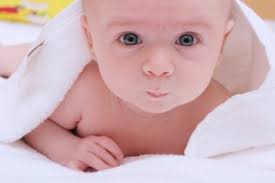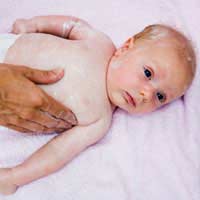At times it can be confusing because the pimples can appear strongly at times and then seem to disappear at other times.
Baby acne is a problem of skin and defined as inflamed blackheads, red pimples and whiteheads. Baby acne commonly appears on the arms, legs, shoulders, face and buttocks. Baby Acne can be seen in newborns usually between the ages of 4 weeks of age and six months of age. Not all babies get it but a large number do. Baby acne usually appears on the baby´s cheeks and on other areas
 of the face. Doctors say that baby acne happens as a direct result of the mother´s hormone levels when she is giving birth. During childbirth and for a short period of time before, the mother´s hormones are allowed to pass through the placenta to the baby.
of the face. Doctors say that baby acne happens as a direct result of the mother´s hormone levels when she is giving birth. During childbirth and for a short period of time before, the mother´s hormones are allowed to pass through the placenta to the baby.Baby Acne Symptoms
1. Red bumps predominantly on the cheeks, quite common on the chin and forehead also.
2. Baby acne will be at its peak when the baby's skin is irritated, or when the baby is hot or fussy.
3. If the baby's skin becomes wet from spit-up, saliva or milk, the condition may appear worse for several days.
4. Fleshy or red pimples occur predominately on the cheeks, but are also quite common on the forehead and chin. Whiteheads are sometimes present.
Baby Acne Treatment
1. Drink fresh fruits juices and large amount of water.
2. Never pinch or scrub milia or baby acne.
3. Do not squeeze, dig, touch or pick the acne.
4. Use paper towels to pat the affected area dry and throw it away.
5. Benzoyl Peroxide 5% lotion is very effective to remove acne from the skin.
6. Apply a little medicine such as hydrocortisone cream for baby acne.
7. Zinc is a mineral that helps with the healing of tissue as well as helping with scar prevention. Zinc is also helps the body to resist infection and inflammation. However, high doses of zinc are toxic, so avoid taking more than 100mg per day.
8. An herbal blend that can help with acne consists of equal parts of the herbal extracts of sarsaparilla, yellow dock, burdock, and cleavers. These herbs are believed to be potent blood and lymph cleansers. Half a teaspoon per day of this blend can be taken three times per day combined with a healthy diet.
9. Don't put creams or oils on his skin, either, because these can also make the acne worse. If your baby's acne is severe and likely to scar, his doctor may suggest an over-the-counter treatment like benzyl peroxide or even a prescription medication. But usually patience is the best course of action. Your baby's acne doesn't bother him in the least, so try not to let it bother you, either.








